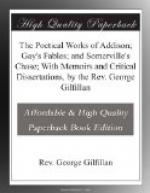We have already indicated our opinion alike of Addison’s character and genius, but must be permitted a few closing remarks. Both partook of the feminine type. He was an amiable and highly gifted, rather than a strong or great man. His shrinking timidity of temperament, his singular modesty of manners, his quiet, sly power of humorous yet kindly observation, his minute style of criticism, even the peculiar cast of his piety, all served to stamp the lady-man. In taciturnity alone he bore the sex no resemblance. And hence it is that Campbell in poetry, and Addison in prose, are, or were, the great favourites of female readers. He had many weaknesses, but, as in the character of woman, they appeared beautiful, and cognate to his gentle nature. His fear of giving offence was one of the most prominent of these. In his writings and in his life, he seems always treading on thin ice. Pope said truly of him—
“He hints a fault, and hesitates dislike.”
But this was not owing to malice, but to the bashful good nature which distinguished him. It is true, too, that he hints a beauty, and hesitates in his expressions of love. He says himself the finest things, and then blushes as if detected in a crime; or he praises an obvious and colossal merit in another, and then starts at the sound himself had made. His encomiums resemble the evening talk of lovers, being low, sweet, and trembling. Were we to speak of Addison phrenologically, we should say that, next to veneration, wit, and ideality, his principal faculties were caution and secretiveness. He was cautious to the brink of cowardice. We fancy him in a considerable fright in the storm on the Ligurian Gulf, amidst the exhalations of the unhealthy Campagna, and while the avalanches of the Alps—“the thunderbolts of snow”—were falling around him. We know that he walked about behind the scenes perspiring with agitation while the fate of “Cato” was still undecided. Had it failed, Addison never could, as Dr Johnson, when asked how he felt after “Irene” was damned, have replied, “Like the Monument.” We know, too, that he sought to soothe the fury and stroke down the angry bristles of John Dennis. To call the author of the “Campaign” a coward were going too far; but he felt, we believe, more of a martial glow while writing it in his Haymarket garret than had he mingled in the fray. And as to his secretiveness, his still, deep, scarce-rippling stream of humour, his habit, commemorated by Swift, when he found any man invincibly wrong, of flattering his opinions by acquiescence, and sinking him yet deeper in absurdity; even the fact that no word is found more frequently in his writings than “secret” ("secret joy,” “secret satisfaction,” “secret solace,” are phrases constantly occurring,) prove that, whatever else he had possessed of the female character, the title of the play, “A Wonder—a Woman keeps a Secret,” had been no paradox in reference to him.




